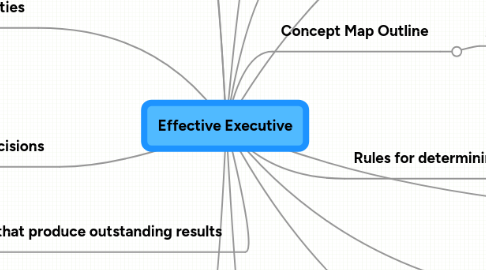
1. 5. Make Effective Decisions
1.1. make effective decisions
1.2. start out with what is right
1.3. Focus on results not work
2. Have a responsibility for an organization
2.1. Responsibility should be result oriented
2.2. Show you are willing to be accountable for certain results.
3. 4. Concentrate on a few areas that produce outstanding results
3.1. Concentration is the secret!
3.2. The more one can concentrate time, effort, and resources, the greater the number and diversity of tasks one can actually perform.
4. Executive realities
4.1. Know they are within an organization
4.2. See the things from inside, not outside
4.3. Keep on operating
4.4. Know executive's time belongs to others
5. 3. Build on strengths
5.1. Staff from Strength
5.2. Manage Your Boss
5.2.1. Build on your boss's strengths, in turn making the overall outcome effective.
5.3. Make Yourself Effective
5.3.1. Choose to do the right things
5.3.2. Do the things you are best at
5.3.3. Multiply performance capacity through collective
6. Effectiveness is not
6.1. Efficiency
6.1.1. Doing things the right way
6.2. Skills learned through training
6.3. Knowledge learned through books
6.4. Inborn talent
6.5. What you want to do.
7. Get the knowledge
7.1. What needs to be done
7.2. Set priorities
7.2.1. post-pone other non-priority tasks
7.3. What an organization needs
7.4. After doing top-priority tasks, reevaluate your priorities
8. Write an action plan
8.1. Statement of intentions that needs to include:
8.1.1. Desired results
8.1.2. Probable restraints
8.1.3. Future revisions
8.1.4. Check-in points
8.1.5. Basis of the time management
8.1.6. Get feedback
9. 1. Know Thy Time
9.1. Log ones time 2 x year
9.1.1. record, manage and consolidate as necessary.
9.2. Don't do what doesn't matter
9.2.1. if this were not done at all? If nothing…then stop doing it
9.3. Delegate what can be
9.4. Identify time-wasters
9.4.1. Too many people on a job can waste time.
9.5. Group time together
9.6. Consolidate "discretionary time"
10. Act
10.1. First thing first
10.2. Consider taking responsibilities
10.2.1. For decisions
10.2.2. For communicating
10.3. Focus on opportunities
10.4. Make meeting productive
11. 2. Focus on Outward Contribution
11.1. Direct results should be clearly visible.
11.2. Identify the goal and purpose of organization.
11.3. Specialize in one thing.
11.4. Look for unused potential in your job.
11.5. Four basic requirements of effective human relations:
11.5.1. The right Human Relations
11.5.1.1. Teamwork
11.5.1.1.1. Contribution leads to communication, allowing teamwork to happen
11.5.1.2. Communication
11.5.1.2.1. Be responsible for your contributions to the team
11.5.1.3. Self-development
11.5.1.3.1. Always looking for ways to better themselves
11.5.1.4. Development of others
11.5.1.4.1. Drive others to better themselves too
